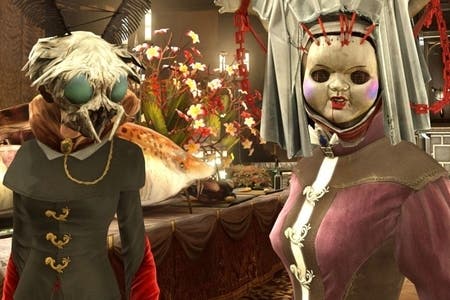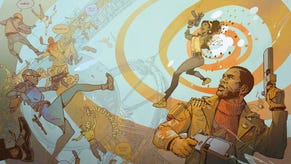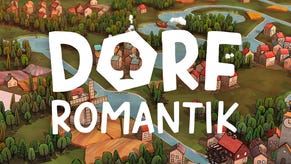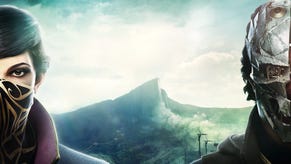Dishonored Diary: Playing through in four different ways
Psycho Oli, clumsy voyeur Martin, archaeologist Chris and Tom the ghost all sign off with final thoughts.
As Dan Whitehead noted in our Dishonored review, the city of Dunwall is a place where the main story takes a back seat to the adventures you define for yourself. For some this will be a world full of sorcery and bloodletting; for others it's a living museum of ideas, where every scrap of discarded paper and overheard conversation is a new exhibit; and for many others it's a game about crouching behind bushes and staring through keyholes.
But just how far can you push Dishonored? And if you're going into the game with an agenda, how much fun are you likely to have? To answer that question, we've assembled a crack team of role-playing commandos to spend the next few days probing the boundaries of violence, stealth, exploration and endurance. We know you'll be playing at the same time, so we'll make sure each post is headlined in a way that identifies its location in the game and helps you to evade spoilers about things you may not have seen.
But what about our cast of players? First up, Oli Welsh is our psychopath. He's going for a high-chaos playthrough. He may be stealthy, he may be provocative; for Oli, the Dishonored playset is a toolbox for inflicting pain and misery. Martin Robinson is the clumsy voyeur. He will be as stealthy as possible, but if Deus Ex was anything to go by then he may occasionally puncture his hard-earned bubble of anonymity by barging into a teetering pile of cardboard boxes. Christian Donlan is the archaeologist. He'll be peeling back the layers of intrigue Arkane Studios has painted and sculpted into Dunwall's architecture, history and people. And Tom Bramwell is our ghost. He's already finished the game and will be attempting a second playthrough on Hard without alerting anyone.
We're playing on a mixture of consoles and PCs. And we hope you'll join in by posting your experiences in the comments. Enjoy!
We'll be posting new diary entries from Friday through till Monday. The latest will appear at the bottom so newcomers can read through in order, and we'll update the article strapline and tweet about new additions as we make them. Follow us on Twitter.
UPDATE #1: Tom has some spoiler-free tips for tailoring your first playthrough
I have already completed Dishonored, so the first thing I should probably do is promise not to spoil it for you. I promise not to spoil it for you! While Psycho Oli, Clumsy Voyeur Martin and Archaeologist Christian will be discovering the game at the same time as you, I will be focusing on what it's like to play through a second time. I'm a great lover of stealth, so I will be going for a low-chaos, zero-kills, zero-guard-alerts run that will probably see me hitting the quickload key more than WASD. I'm playing on Hard.
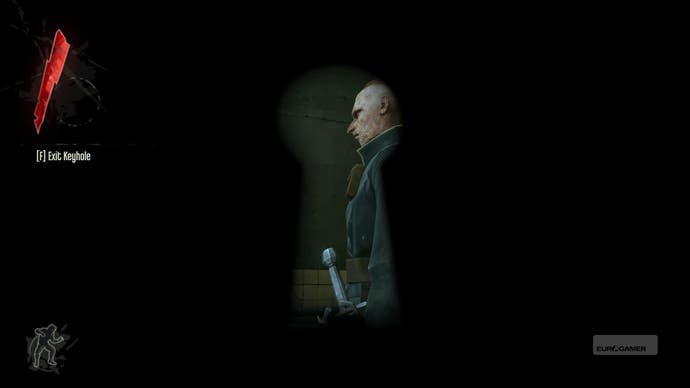
I've already started with that and made it halfway through the first proper mission after the tutorial and Corvo's prison break, but before I get into what that's like, I wanted to use this first post to share some suggestions you might want to consider before you start playing the game at all, because with the benefit of hindsight there are a few things I would recommend to new players. Once again, I promise not to spoil anything.
1. Play it on the PC if you can
The first time I played through Dishonored was on Xbox 360. As Tom Morgan noted in the Dishonored face-off, all three versions of the game are technically accomplished, but based on my experience the single most annoying thing in the game is struggling to line up the Blink teleportation ability under pressure. It's something Dan complained about in our Dishonored review, too, and having switched to the PC version for my second playthrough, I can already report after just two hours' play that the mouse is a much better tool for blinking. Pretty much everything in Dishonored is optional except for blinking, at least if you intend to have any fun with it, so go with the PC for control's sake if you can.
2. Stealth first, chaos later
My biggest regret about my first playthrough is that it was a slightly muddled affair where I remained undetected as much as possible but still couldn't walk within 50 feet of someone's pulsating jugular without sticking a knife in it and then throwing the corpse off a rooftop. The reason I regret it is that now I look down the list of achievements I can see loads that would tempt me into more playful high-chaos approaches. "Cause five unintentional suicides," for example. I wish that I had snuck through the game first, searching out every hidden pleasure, and then gone through it again treating each alarm trigger like a dinner bell - savouring every enemy who turned up as I clamped the jaws of the game's various overlapping combat abilities around them in ever more imaginative ways.
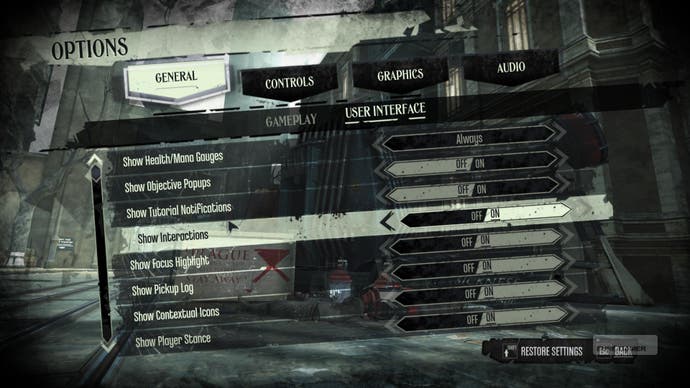
3. Turn off the objective marker
Completely hardcore players may want to dip into the User Interface options and disable every form of assist - you can turn off health and mana gauges, tutorial notifications, interactions, pickup logs, contextual icons, you name it. I don't think many of those things compromise the fun you have - and I would still keep things like item and interaction highlights switched on, because this is a world where only one of out of every ten things on any given table is likely to be interactive - but I would definitely turn off the objective markers. This is a game where you want to take your time and explore for yourself, and the constant reminder of your next big objective (or sub-objective)'s proximity is a piercing presence. Worse, some of the marker labels spoil the surprise of how to achieve things; it's more fun to formulate plans and put them to the test than to be given obvious clues.
4. Trust the game
Given the backgrounds of the people who made it and the fact that you're an assassin, you might imagine that Dishonored is a game that respects stealth and purity more than anything else, and initially it doesn't do much to disabuse you of that notion. The Mission Stats screen at the end of each level, for example, features tick-boxes for "Don't Kill Anyone" and "Ghost (Never Detected)", but if the game also approves of my wind-blasting sentries over balcony railings when they're not looking, then it is keeping its counsel. However, the systems will bend both ways, and sometimes the results are unusual. Want an example? Let's say you've done something that seems to rule out one of your other objectives. Well, don't always assume it does.
5. Take your time
The halo effects on items, the objective markers, the Mission Stats screen and the nagging achievement descriptions make it surprisingly easy to bound through Dishonored glossing over everything that isn't part of a currency, inventory or scoring mechanism, but whatever your play style, remember to look outside the collectables and enjoy the depth of detail in your surroundings. In the very first proper mission, you can break into a house and steal things quite easily, with only one guard to kill and a pesky maid who will cower in a corner at the very sight of you. But if you stay out of their way then you realise they are engaged, and you get to hear them bickering about their duties and nuptials.
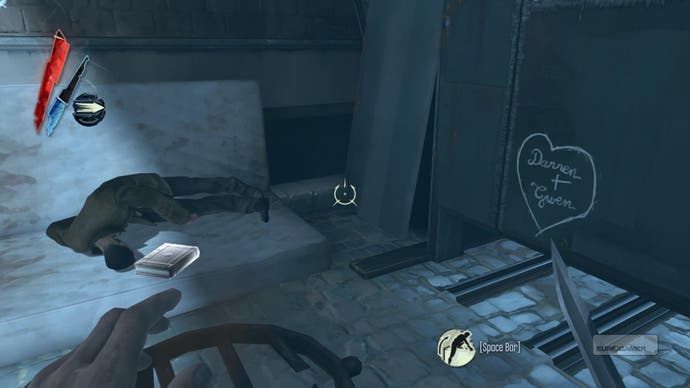
Listen to people. Read the faded posters on the walls. Stare at the whaling ships, which hoist the carcass high above the deck so the crew can work on it as it returns to port. Pay attention to the music. Dishonored is a surprisingly narrow and focused game, despite its wealthy systems, but Dunwall itself is much more than the sum of its pickups, and it would be a shame not to enjoy all the wonderful details that Arkane has arranged for you.
With that, I'll leave you to it for a bit. I'm off to see how much I can do and find without ever swinging my sword or firing a bullet...
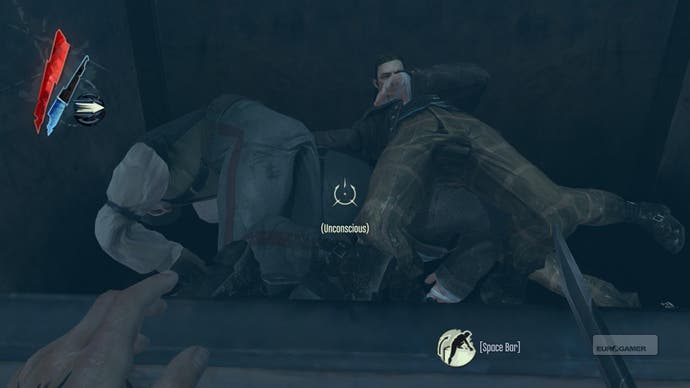
UPDATE #2: Chris takes to the water
Nobody ever wants to spoil the end of a game, but personally I'm always a bit protective of the beginnings, too. After all, most game narratives conform to a handful of fairly predictable denouements, and by that point you've generally had your fill anyway. Beginning, though? Beginnings are special. Everything's new and exciting, and the game's trying to put its best foot forward. In this diary entry, I'm going to talk about the very beginning to Dishonored. Please consider this a spoiler warning.
You arrive in Dunwall by sea, winched down in your little jolly boat from the giant metal hull of what I assume is either a warship or a whaler. Whalers, even in the real world, didn't just catch the beasts; they processed them too, like little floating factories. Dishonored's world still runs on whale - their oil lights the lamps, their flesh fills the nasty tins of food you see scattered around - so it wouldn't be surprising if the little factories had become big factories.
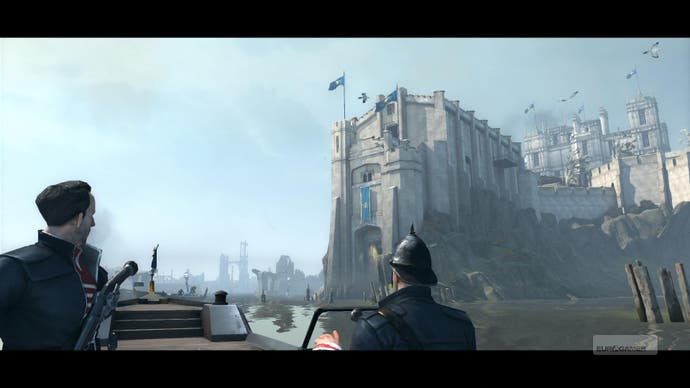
I'm playing - or trying to play - Dishonored as an archaeologist, so I'm as excited about uncovering the stories behind this weird landscape as Tom is about writing his own onto it, one non-lethal takedown at a time. I don't think the game's opening half hour or so is particularly brilliant from a mechanical point of view, but it's absolutely filled with neat hints at the world and the story.
Dunwall, as it looms out of the mist, is a true blend of influences: a muddle of Victorian London and Edinburgh, a blend of stone and wood. The skyline's as comfortable with brutalist hulks as it is with gothic finials, meanwhile, and the whiteness of the place? The whiteness is horrible: parched, faded, dying.
The city is dying, in fact: the introductory sequence is teaching you to move and shoot and stab people in the neck, but it's also trying to offload a little backstory. There's a rat plague gripping the streets, and you've just returned from a foreign trip, trying to drill up some support to tackle the menace. Support, though, has not been forthcoming. Rival cities would prefer to blockade Dunwall and study its collapse. Who are the rats now?
Dishonored's a game about being framed, so it's not so surprising when someone important is murdered and then you wake up in prison. The prison, which you're guided through in part by notes from a mysterious ally, is a stealth playground in which you haven't yet got any particularly meaty powers to mess with. No matter: even here there are insights into the fiction.
Whale oil tariffs are tacked to the wall, yet more reminders of the leviathan's hold over the economy. There are also a few reminders - if the Dickensian clutter wasn't bad enough - that Dunwall isn't very nice. It's a city where posters invite you to watch hound fighting in local pubs - there are actually crates for hound transportation all over the prison itself. It's a city where the tannoy system has to inform people that, sadly, there won't be enough seats at the next execution to let everyone come and watch.
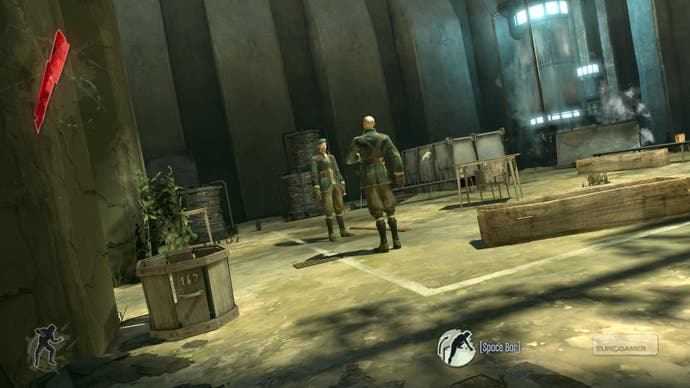
I don't like Dunwall, then, but I'm definitely not supposed to. Instead, I'm meant to love it, in the same horrible way you love the London - also flecked with traces of Edinburgh - that provides the backdrop for Jekyll and Hyde. Do I love it yet? It's early days. I'll know more when I get out of this prison.
UPDATE #3: Martin pops round Dr. Galvani's on the way to High Overseer Campbell
I'm surprised no one's twigged that when I got off the boat I wasn't the same bodyguard that left all those months back. I've returned as something far, far more dangerous.
In my hands right now, Corvo's not so much a master assassin as the dunce of Dunwall, a blundering menace to anyone who dares cross his stumbling path. Within seconds of returning to the city's dirty shores I'd dissolved the entire loyalist movement after getting butterfingers with a canister of whale oil, and I'm pretty sure I've earnt a less than fearsome reputation as a shabby Batman among my foes. I can't quite get the hang of the drop assassinations' timing, so right now I'm flopping on top of enemies, apologising profusely, and then duly getting a knife in the throat for my troubles.
Not that I'm bothered too much. I'm clumsy in most walks of life, and especially in games where I often get that nagging feeling that I'm doing it all wrong. It's not that Dishonored encourages sloppy play, but I've yet to feel berated by it for my stupidity - and right now, as I spill through the tutorial and the first mission proper, its world feels as deliciously analogue as those early tastes first promised.
Although I'm fairly certain that I'm still playing it wrong. The prison escape was an awkward mess of fists, thumbs and a few more corpses tossed in the dirty river than I'd have liked, and I couldn't even get through the central mission hub without a few accidental casualties.
When it came to taking down the first mark, High Overseer Campbell, well…. Well, I haven't quite got round to that yet, having been distracted by the pleasantly filthy urban creek of Bottle Street. There's something mesmerising about the streams of rain that run down the pavements, and after stopping to check in on Granny Rags my distractions doubled.
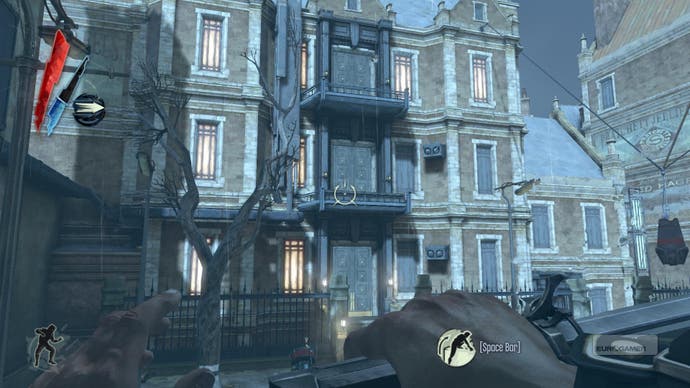
A diversion to a scientist's stately home with the ultimate goal of breaking into his laboratory has gobbled up a whole hour of playtime. It's a brilliantly tangible place, complete with all sorts of nooks and crannies that feel like they've been properly lived in. And then there's the art - oh the art! I'm sure Dishonored's got more to show me, but right now I don't think anything can top the textures of its oil paintings, all cracked and bubbling in the dim light.
So I've spent my time dusting down bookshelves and exploring these little traces of Dr. Galvani's life. Only occasionally do guards stop me in my wanderings, and they're duly beheaded for their ill manners. I feel a little like a homicidal visitor to a National Trust site, caught in an odd-loop of sightseeing and mindless murder. Actually, come to think of it, maybe I'm playing it the right way after all.
UPDATE #4: Oli rediscovers the lost art of bloody murder
I didn't like the noise the guard made as he coughed up phlegm, so after I'd stabbed him in the back of the neck, I carefully laid his body across the threshhold of the jail. Then I closed the giant rolling steel door on my way out. Splat.
This is my Corvo; if he ever had any decency or restraint, he lost it in those six months in jail. He's a sadistic lunatic whose motivation isn't revenge so much as an opportunity to create mayhem. I'm going for a high-chaos playthrough, in other words, the opposite of Tom's ghost. My goals are to leave as few people living as possible, and to devise as cruel and unusual ways to relieve them of their lives as I can.
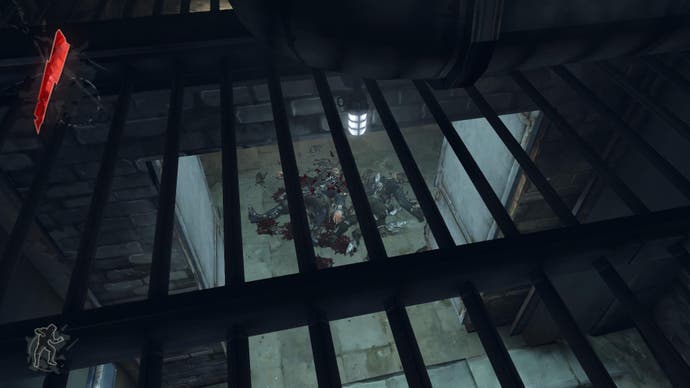
This doesn't exactly come naturally - given an opportunity to role-play, I'll usually be the good guy, and I've never been a gore-hound. Then again, I have no great fondness for painstaking stealth play and I have a particular hatred of obsessive quick-save gaming, so this approach suits me better than the alternative.
What's interesting about the way Dishonored has been designed is that my psychopathic play-style is far from being the easy way out.
You can't really play the game without being stealthy at all - well, you can, but it would be this much fun: none fun. (Besides, stealth presents too many opportunities for creative violence for a true psycho to ignore.) Open combat is brutal and requires quick reflexes and a good stock of health potions. The path of least resistance in Dishonored is probably an economical one of careful exploration, stealth and selective, unobtrusive murder.
If you want to really rack up a bodycount - and to see the Very High Chaos ending you need to kill more than 50 per cent of everybody - you have to plan the encounters almost as carefully as a nonlethal ghost, and you'd better come prepared. So I've loaded all my early runes into Vitality to give myself as much survivability in combat as possible.
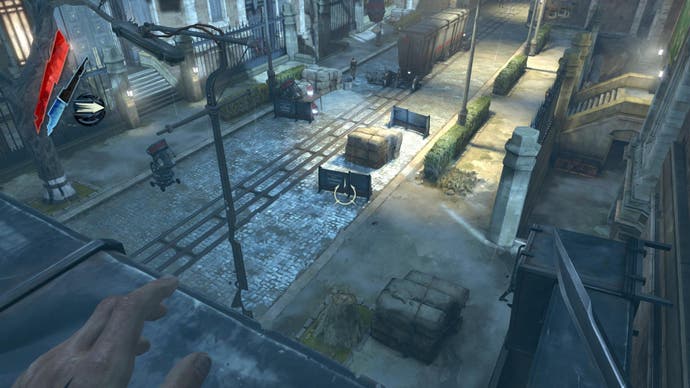
Then it's just a case of devising strategies for thinning the crowd. An early favourite is to take to the rafters, pick off the first goon with a crossbow, drop down sword-first on the second while he's still wondering what's going on and then mop up any stragglers mano a mano. Or - having now treated myself to the Devouring Swarm power - how about summoning a swarm of diseased rats, watching as it draws another guard or two into its nibbling maelstrom, and then rolling a grenade into the resulting mess? Lovely.
Above all, though, I'm a fan of lacing my sociopathic behaviour with dramatic irony: for example, rewiring the Wall of Light forcefields to fry guards instead of me, then standing in plain sight with my weapons sheathed and waiting for them to notice me and run straight into their own doom.
Or there's the way I took down my first mark. The nonlethal takedown for High Overseer Campbell - I won't spoil it - sounded cruel enough to appeal to my evil nature, and I happened to have a sleep dart on me. What the hell. I went through the motions, set it up and humiliated the man.
Then I chucked a springrazor trap at his feet that chopped him into little bits.
UPDATE #5: Tom perfects the art of hiding bodies
Having now spent six hours just getting to the end of the High Overseer Campbell mission in low-chaos, non-lethal fashion without ever being detected, I'm beginning to get a sense of the scale of the task I've set myself for this second playthrough. (And to illustrate my experience, I'm also going to discuss what happens in the mission in a fair bit of detail, so if you haven't finished this level yet, come back when you have.)
When I was playing this mission at high levels of chaos last weekend, I got to the point where Campbell attempts to poison Captain Curnow with a glass of tainted wine and I switched their drinks so the High Overseer would seal his own fate. This time I was determined not only to take a non-lethal path but also to save Curnow. I knew that if I let him die then the game would probably blame that on me.
I thought I was doing pretty well on my first run through today, but something weird kept happening when I went into the meeting room to remove the poisoned wine: whenever Campbell and Curnow reached a certain point in conversation, the doors to their chamber would fly open and guards would come rushing in. I hadn't alarmed them, and I tried various ways of concealing myself - hiding under the table, blinking into the rafters, leaping out of the window, you name it! It kept happening. Something was up.
So I took down Campbell and let Curnow go and pressed on to the end of the level. The Mission Stats screen told me an unhappy story. Dead or Unconscious Bodies Found: 1. Hostiles Killed: 1. Didn't Kill Anyone? Box not checked. Ghost? Box not checked.
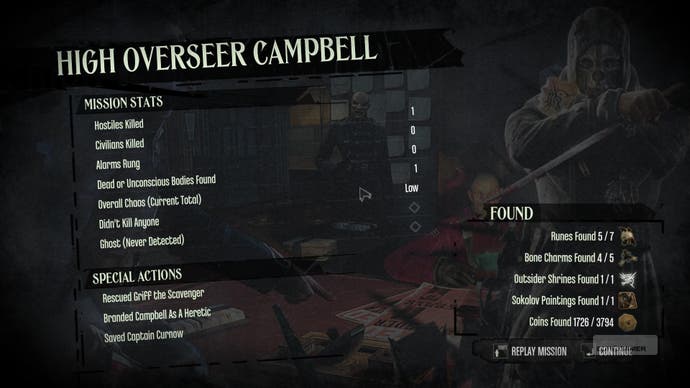
I thought back over what had happened and tried to figure out who died. OK, maybe it was one of the thugs outside Granny Rags' house? I incapacitated them and then moved the bodies, but one of the bodies disappeared while I was traipsing between a nearby dumpster and their unconscious forms. I suppose he was probably eaten by Granny's little birds. Oops. As for the body that was discovered? No idea.
I had a bunch of save files, but no easy way of telling where I'd made the crucial mistake. It might have been one of the guards I stashed in a side room in the Overseer's mansion, somehow discovered on another guard's rounds, but it could just as easily have been the very first sentry I took down and threw in a boat full of plague corpses. I'd left him snoozing away, but what if someone happened on him?
There was nothing for it: I would have to play through the whole level again.
This time would be different, though. I would deal with Campbell and Curnow as elegantly and silently as possible, and this time I would make sure all my bodies were properly hidden. No mistakes. I would identify several unreachable locations in each segment of the level and use those to deposit all my snoozing adversaries.
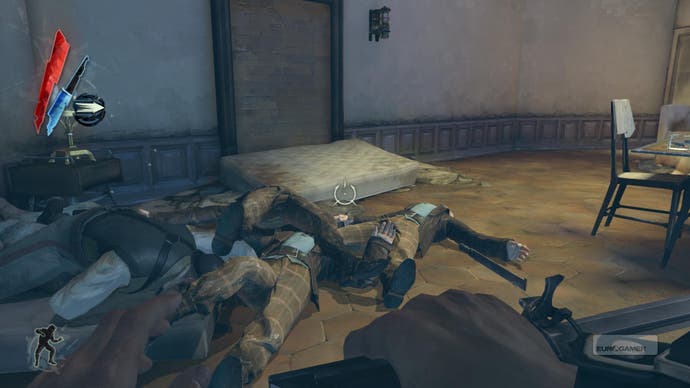
Initially this proved fairly easy - there are a few handy apartments that can only be reached via rooftops - but I had to be inventive when I decided to call on the Dunwall Whiskey Distillery and ran into somebody roaming among the ageing casks. I had him unconscious, but where to dump him? I had an hour of prowling ahead of me, during which his friends could randomly deviate from the routines they followed a hundred times before - guards sometimes do that - and wander in at any time.
Fortunately, I managed to find just the spot.
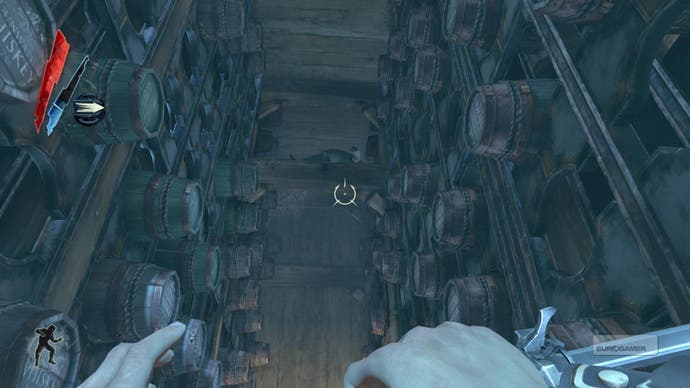
As I crept deeper into the Overseers' midst, I continued to research new hidey spots for bodies. Rooftops are definitely my favourite.
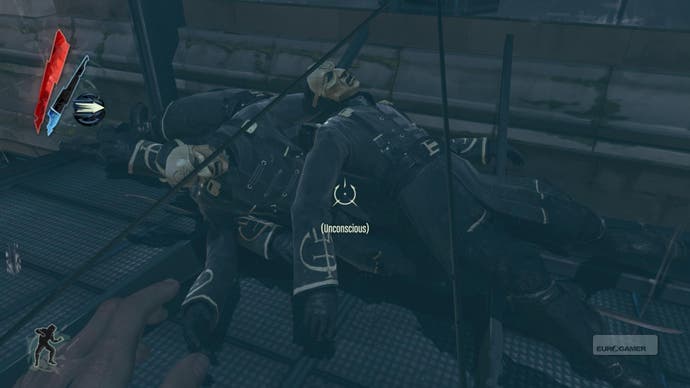
Eventually, after a lot of quicksaving and quickloading, I made it back to the High Overseer's meeting room, and this time everything went to plan! The doors didn't fly open. Nobody came rushing out. Campbell and Curnow wandered into the room, discovered the wine glasses smashed, and exited in the direction of Campbell's secret chamber.
Ah.
Campbell's secret chamber happened to be one of my primary hidey spots.
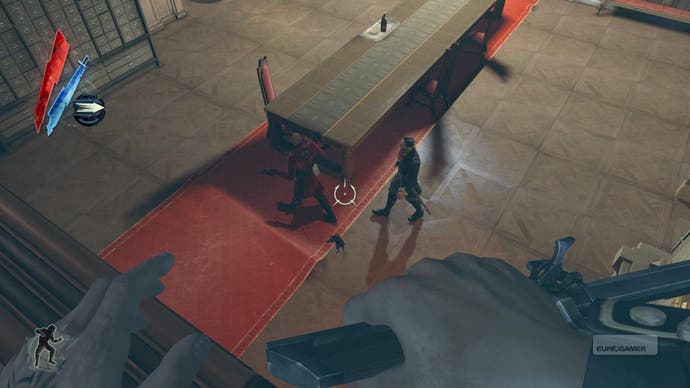
Now, I usually like to take a bunch of screenshots while I'm playing to illustrate these posts, but I'm afraid I don't have any for the minutes that follow. That's because, after a sudden realisation that I only had one quicksave on the go (idiot) and I had just hit F5, I was now in a race against time. I would need to blink madly down to the secret chamber (which is hidden near the interior entrance to the kennels, in case you haven't found it) and basically shovel bodies out of it as fast as my Piero elixirs would ferry me. The problem was also somewhat exacerbated by the fact that there is only one way out of that whole area - up a long staircase halfway to where Campbell and Curnow would be approaching from.
After a few attempts I realised it just wasn't possible, so I compromised. I piled the bodies in Campbell's secret den up into a neat stack behind a vanity screen, and then as the two men entered I shot them with sleeping darts. Mercifully, neither twigged enough at the other's misfortune to go into an alert state. Pheeeeew.
Captain Curnow is now sleeping happily in a dumpster. High Overseer Campbell has been branded a traitor. And I have my first completely non-lethal ghosted low-chaos level completion in the can.
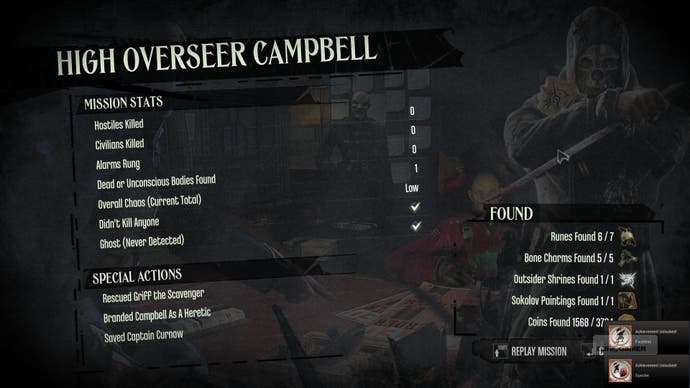
So yes, the scale of my task in the levels ahead is growing ever more ominous. But if every attempt to play the game this way is as dramatic and intense as High Overseer Campbell ended up being, then I've got a weekend to remember in store.
UPDATE #6: Chris gets down with the rats and the hounds
Given the things I've been learning about Dunwall, I probably shouldn't have been too surprised that the city's response to the rat plague isn't exactly compassionate. In the sewers, where I ended up after the prison, I explored a chamber where plague corpses were inelegantly dumped, via a pipe in the roof, so that the rats could get rid of the remains. Up on the deserted streets of the drizzly metropolis, meanwhile, on a mission to assassinate Overseer Campbell, well, I saw what can happen if access to that pipe isn't handy.
There's a wonderful sense of fear to Dunwall: a kind of claustrophobic paranoia that gives each map a real energy, even before you've started sticking your clockwork nose into other peoples' affairs and generally shivving them through the eyeball. This feels like a sick city in more ways than one. The streets are empty of civilians, the City Watch is always circling, with its teetering beetle-like carts (I suspect these may be used for the transport of bodies) and - oh yes - the houses where plague victims are found get a very special treatment.
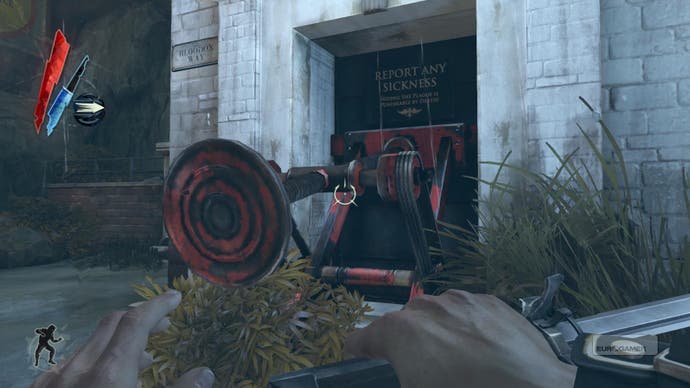
It took me a while to work out what I was seeing at first: doorways covered in metal shuttering, windows boarded, and pneumatic braces blocking the exits. Then I realised: it's a hideous kind of portable quarantine zone. When a plague victim's been spotted - the punishment for not turning in sick neighbours is death, according to a friendly placard I saw - the Watch turns up and just seals you into your home, trapping you inside to cough yourself to death, or to be consumed by the tidal waves of rats that rush around the place.
It's a brutally efficient response to an epidemic, and a brilliantly ghoulish bit of visual storytelling: it works so well because realisation dawns slowly, as the machinery starts to make sense, and you also get an insight into the panicked, helpless thinking behind the whole thing. Dunwall isn't reacting to the situation it's found itself in very well: even the Watch themselves have gone into a flap - and a lot of the Watch seem to be nursing rather nasty chest ailments, too.
On my way to poison Overseer Campbell, I couldn't resist a trip through the kennels, incidentally. Like any good storytellers, the design team behind Dishonored know how to build something up for effect before revealing it, and ever since I first glimpsed a playbill back in prison, I've been excited to see the wolfhounds that fight in the pubs and provide a little extra bite to the forces of the Watch. Down beneath the Overseer's private rooms, there's a whole network of cells where wolfhounds are kept alongside any prisoners the Watch have hauled in.
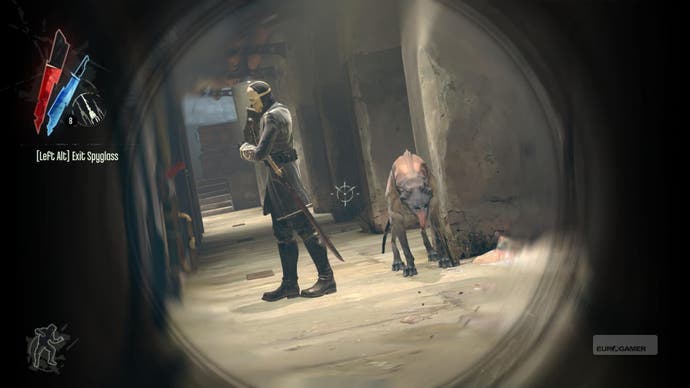
They're horrible things, the hounds: lean, muscular bodies, giving way to sharp crocodile heads. Teaming up with such beasts is another indicator of the local government's helpless kind of corruption, I suspect. They're in over their heads on this one, and their allies are the kind of allies only desperate thugs would choose.
With Campbell dead and the hounds mostly avoided, I'm now headed back to my quarters in a dockside pub that looks a bit like the Queen Vic. There I will catch up with the tattered remains of the Loyalist movement: British gentry who all speak with Californian accents. There, I will prepare for my next trip into this weird, frightening city, on a mission both to kill and to learn a few more of its secrets.
UPDATE #7: Tom establishes The Code of the Clean Hands
It wasn't a conscious thing when I started a non-lethal playthrough of Dishonored to go achievement-hunting, but it's become clear as I progress that the measure of my success will be whether I finish with "Clean Hands", the reward for completing the game without killing anyone knowingly or otherwise. Having finished the game once already on high chaos, it's exciting to imagine how I might get around some of the most compelling assassinations, all without failing objectives or resorting to violence.
It's not easy to avoid killing people in Dishonored. There are some obvious no-no's, like throwing unconscious people in the river (they drown, or if they're particularly unlucky then you get to watch them being eaten by hagfish), but you're also in trouble just leaving bodies lying around. There are rats everywhere, and, as I discovered last night, if you knock someone unconscious and they happen to be eaten by some nearby rats then that's on you as well. Your hands may be clean, but you are not Clean Hands.
I'm gradually establishing a sort of Code of the Clean Hands as I play, and it goes beyond the wording of the achievement, which simply says not to kill anyone. It's all a bit Commander Data - it's not just that I won't harm people, it's that I won't by omission of action allow other people to be harmed either. The designers seem to have anticipated this, because they keep throwing situations into my path that make it very difficult to remain undiscovered while keeping my hands clean. There was Campbell and Curnow yesterday, and today there's a woman I run into while sneaking my way to The Golden Cat (the setting of most of the second major mission).
I'm not going to talk about the Cat, so this isn't really spoiler territory unless you're very precious - this was just a random encounter. I was using a shortcut via Bottle Street to circumnavigate the walls of light the City Watch were operating on Clavering Blvd above me, and as I headed up an alley I saw two of the Watch accosting a young woman.
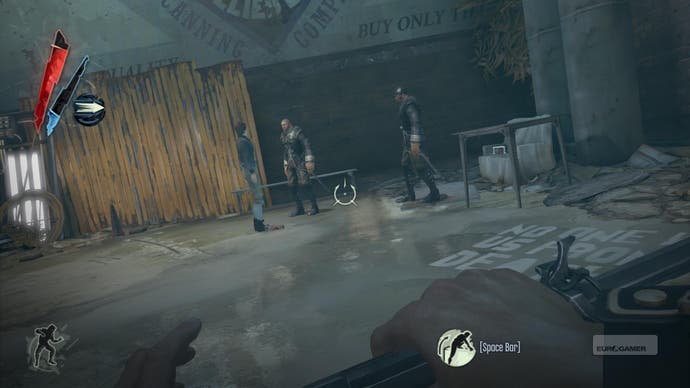
The difficulty with this is that they are standing right next to each other. I'm trying to avoid any guard alerts, let alone deaths, so it's tempting to walk on by. But of course I can't. Maybe the game won't blame me if they kill her, which I'm sure they will if I ignore them, but I will remember. I think it's a testament to the consistency of the game-world that I can't let them kill her. Of course she's no more than some painted polygons and sound files to me, but for some reason it matters.
So I use blink to teleport behind the one who seems furthest away from her, quickly choke him into unconsciousness (I found a handy Bone Charm that speeds this up a few hours ago), and then fire a sleep dart into the other guy's head just as he's about to swing his sword at her. She thanks me and we're on our separate ways. The two members of the Watch are now snoozing in a dumpster.
When you're doing a diary like this, especially over a single weekend, you want to make a lot of progress so you can talk about the juicy stuff you know lies ahead. The fact that we're all still talking about the opening sections just goes to show how easily the city of Dunwall draws you in and how much you want to probe its every recess and ensure the sanctity of whatever play style you've adopted.
With that said, the other major part of my Code so far is something that I don't like about Dishonored. Namely, Dark Vision. Dark Vision is a power that you can unlock with the runes you discover, and it's similar to Detective Mode in Batman: Arkham Aslyum - it lets you see the movements of enemies as glowing outlines through doors and walls. And the problem with Dark Vision is the same as the problem with Detective Mode in Batman: you just want to have it on all the time.
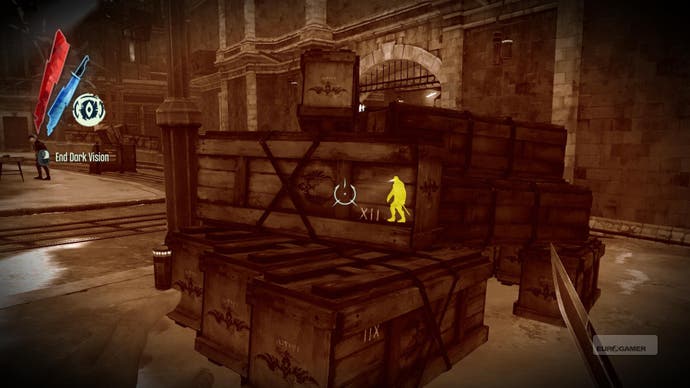
This means that you're constantly switching your current power to Dark Vision, turning it on and then switching back to whatever else you wanted (blink, bend time, etc). As soon as it expires, you switch to Dark Vision and re-enable it. It's hard to get out of the habit of doing this constantly throughout the whole game, and while there is still some tension - it's not as useful as a mini-map in that you can't see behind you without turning - your situation is suddenly substantially less precarious.
So I've decided that's not the Clean Hands way, and I'm not using Dark Vision at all. Haven't even unlocked it. And I advise anyone else who is playing as a pure stealth character to avoid it entirely as well.
The Code of the Clean Hands, then:
- Don't kill anyone or let bodies be eaten by fish or rats.
- Help passers-by while remaining undetected.
- Don't use Dark Vision.
Obviously it's fine to loot everyone's houses for money and food though.
UPDATE #8: Martin barges into The House of Pleasure
The House of Pleasure's done - so don't read on unless you've also finished the mission bearing that name - and I'm a few steps closer to achieving a stealthy playthrough. It's some way off the ghostly approach Tom's taking, and there have been casualties - six in total - but it's at least come in low on the Chaos register.
Thank heavens that Dishonored's definition of chaos doesn't quite chime with my own, because this was anything but serene. I've started hoarding runes and slowly escalating Corvo's supernatural skill-set, but more powers just means more ways for my clumsiness to express itself. Idly fiddling with the Bend Time capability somehow ended up with me throwing an empty vial in Slackjaw's face and having the distillery's workforce chase me through Bottle Street, and a similar bumbling pursuit in The Golden Cat brothel had me blindly blinking straight into the middle of an exchange of services.
Still, Dishonored systems are slowly clicking into place, allowing me to soak in all of its filthy little details. Campbell was seen off with poison, but not before I'd discovered his secret room, a small little chamber draped in red cloth and with a semen-stained mattress at one end that's pocked with discarded underwear. There are all sorts of other strange affairs being conducted in Dunwall's darker corners, and even around the Loyalist's Hound Pits - I spied Piero clumsily trying to woo Calista in the doorway of his lab.
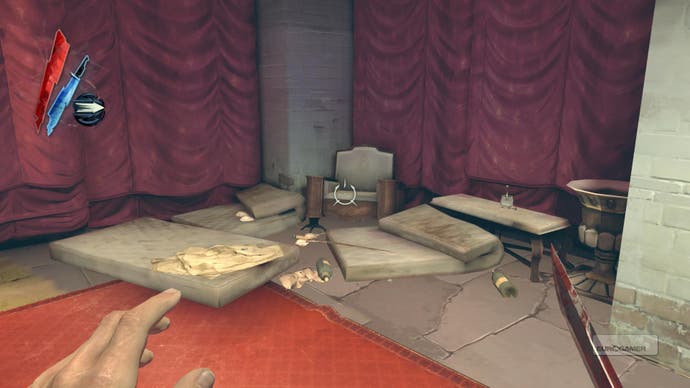
Of course, The Golden Cat's the central hub for some of those murkier matters of the heart. It's a fascinating place, with sordid little stories being played out in each of its rooms. I became a central part of one of them myself, finding the sadomasochistic art dealer Bunting willfully blindfolded and strapped to an electric chair and running a few thousand volts from him in order to get the combination to his safe.
I'm starting to think that some of Dunwall's depravity is starting to inform the way I play. The combination was obtained in exchange for a favour from Slackjaw, which he duly carried out - but I couldn't help but see if the safe was still there for the plundering once those deeds had been done, and so I went over to Bunting's house.
It's a shabby, run-down place, exposing the rather miserable existence that Bunting lives out when he's not indulging himself at the Cat. Slackjaw's henchmen were there, but they could be slipped past with ease, the treasure simply waiting there for the taking. It's not the kind of thing I'd normally do in a game, where I can never quite resist being the good guy, but I'll admit it gave me a certain guilty thrill. I'm not sure how Slackjaw will receive me the next time our paths meet, although I guess I'll find out.
UPDATE #9: Oli deals out 101 damnations
Tom's hands may be clean, but mine couldn't be any more bloody. I've just finished the House of Pleasure mission with 101 kills to my name - 88 hostiles and 13 civilians. Stop reading if you haven't got this far, obviously.
I started out in high enough spirits, continuing my crusade as Dunwall's ironic vigilante, punishing hypocrisy and tyranny with a gruesome kind of poetic justice. Only it seemed I had added bad health habits to my list of unforgiveable sins.
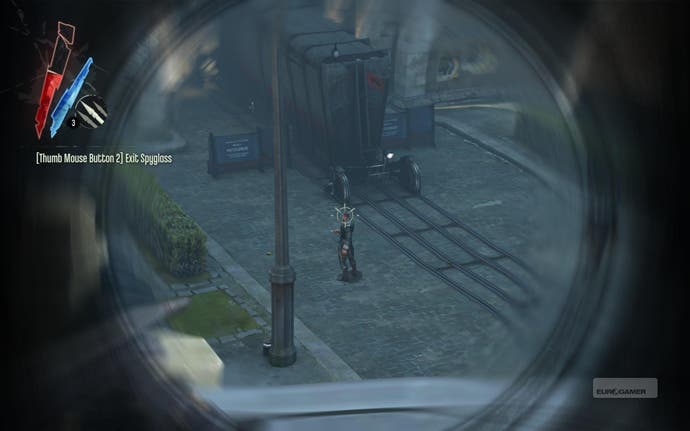
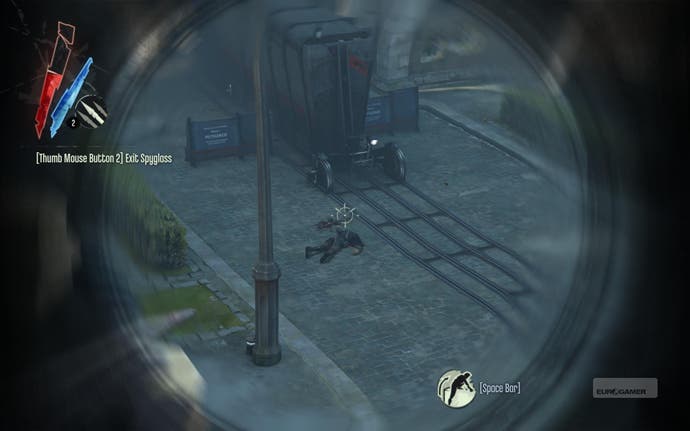
It was also fun to take a mission from the Bottle Street thugs, strolling unmolested through their whisky distillery headquarters (which was odd, since I'd massacred them the last time I was there) whilst planning how I was going to murder every last one when I returned to cash the mission in. I don't tolerate the demon drink, either.
This turned out to be my toughest challenge to date. I liked the idea of slitting boss Slackjaw's throat as soon as we'd concluded our business, but with some seven or eight thugs around in a fairly tight space, that was more heat than I could handle. So I quietly picked off a few around the margins with crossbow sniping and stealth kills and then returned braced for a full-on scrap.
I made it. With runes pumped into the Blood Thirsty power that builds adrenaline to spend on one-shot kills, springrazor traps planted on approach routes and my rats performing crowd control (and clean-up), I can now take on about four enemies at a time without dying or spending too many health potions.
Then I headed into the Golden Cat brothel. You can imagine what my increasingly puritan maniac made of that place.
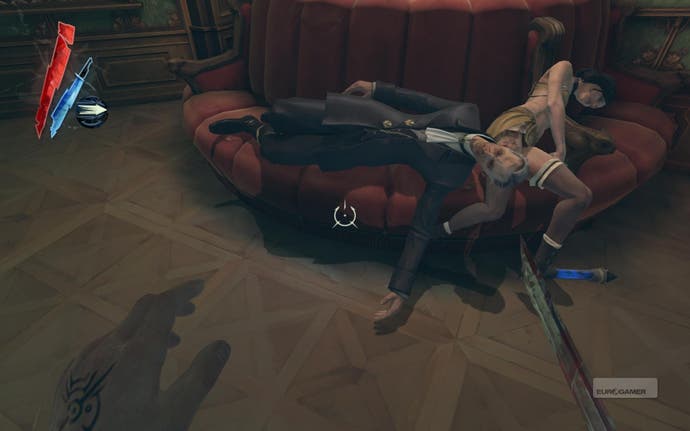
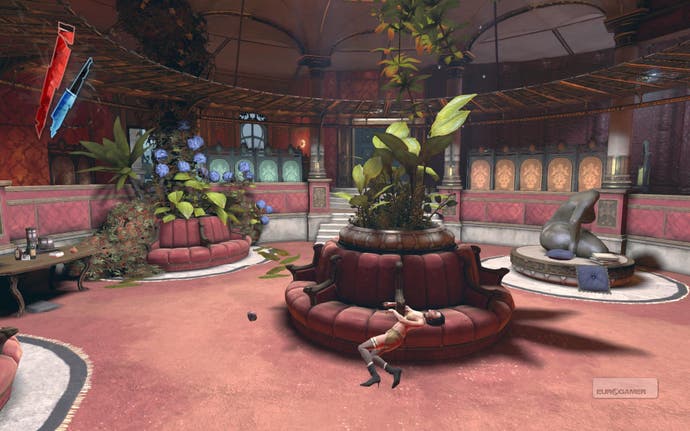
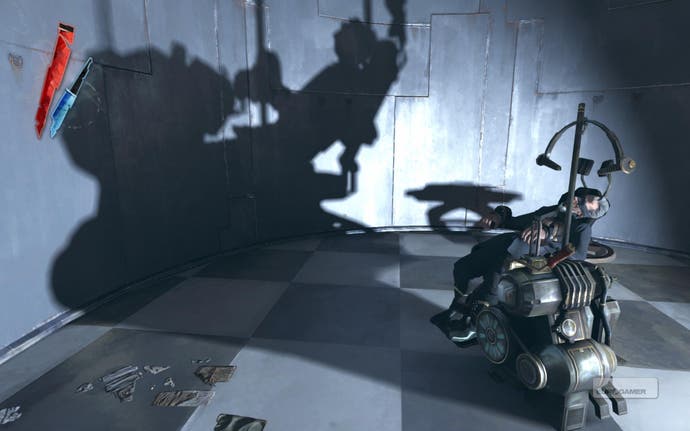
All the killing has started to get less enjoyable, though. Not because it's hard, but because I'm getting too good at it. The Golden Cat wasn't the challenge I expected - I just cleaned it out methodically, room by room, and used all my skills and gadgets to deal with the one panicky alert that happened. I bought Dark Vision too, but to be honest I'm only using it to check that I haven't left anyone alive.
Playing this game this way is making me feel a bit sick. I'm not sure why - I've stacked the corpses higher than this in countless other games with few qualms. I don't think it's the civilian kills either. There's a nagging sense that the game isn't really supposed to be played this way, but that doesn't leave more than a sense of vague dissatisfaction, balanced by the fact that the more violent skills are pretty good fun to use.
Perhaps it's because Dishonored's world is neither amoral nor frivolous. The story's broad-brush stuff, but as Chris has pointed out, the world-building is something else entirely. I'm really quite surprised at how horrible Dunwall is. It's an intensely grotesque, nasty and depressing place, and it's putting me in a dark mood.
Going all Travis Bickle on it should be cathartic, but it's the opposite. I just feel like my feet are sinking further into the filthy quicksand.
Yeah, starting to worry that my "psychopath" playthrough is all too aptly named.
UPDATE #10: Chris heads down the pub
Raiding distilleries, town halls and brothels takes it out of you, particularly when you're not very good at sneaking around. In between accidental fights, it's a pleasure to come back to a nice, roomy hub level in order to take a load off.
I love a good hub, but they're few and far between. I remember spending a lot of nice downtime in Alpha Protocol's safehouses, for example, even though they were a bit impersonal, but so few other games really get it right.
Dishonored's hub is a new favourite: it's a dusty old boozer called the Hound Pits Pub, and while it's primarily a place to level up gear and pick through new gadgets in between missions, it holds a few intriguing narrative elements of its own.
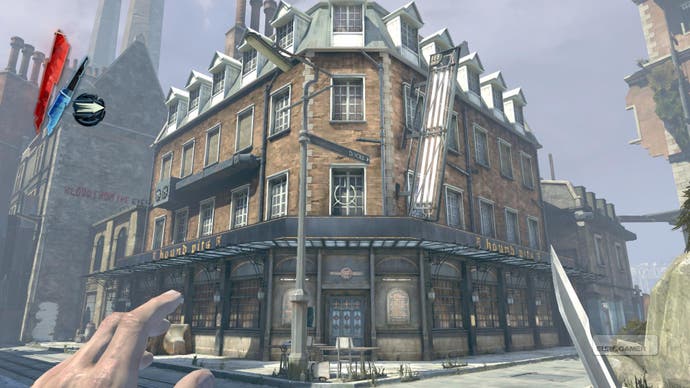
Upgrading is actually one of its weaker aspects, if you ask me. So far, the real fun has been lying with magical powers like Blink, which lets you hop about unseen, and Dark Vision, which allows you to see through walls. Once you can do all that, it's hard to get too excited about being able to carry a few more crossbow bolts, or being a little more accurate when you send them flying into people's nuts.
Instead, I knock around the pub just exploring: finding my way down into the sewers, where collectable scrimshaw and zombie-like Weepers lurk, reading books that offer a little more insight into the politics and science of this weird, half-familiar world, and accidentally breaking windows - that stay broken, brilliantly - when I fire off a pistol round because I've got a gun equipped instead of a magical traversal power.
The detailing is truly excellent: I love the milky trickle of whale oil falling from the refill station in the workhouse, and, like Martin, I could look at the painting textures for hours - well, probably minutes - on end. Even better, there are all these troubling hints waiting to be uncovered: whispered traces that all is not quite as it seems.
Listen in on the pub staff, for example, and you'll find yourself visiting a world of bitterness, backstabbing and resentment. So-and-so's a drunk, or they don't do their work properly, or there's just something a bit off about them. The personal nastiness is every bit as corrosive as the plague, here in Dunwall.
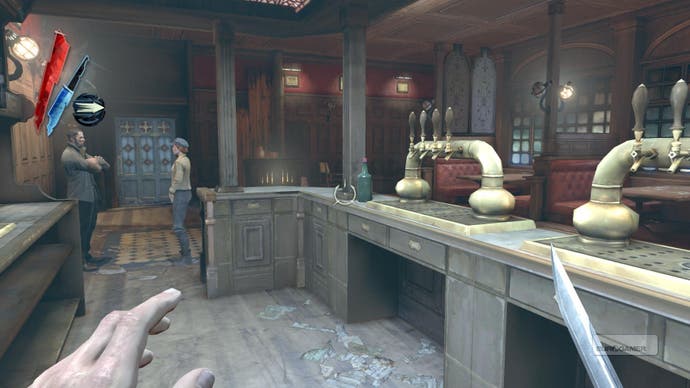
Also, look at the loyalists you're meant to be helping out on their glorious mission. True bar-room revolutionaries, this lot - in every sense of the term. If they're so heroic, why are they letting you do all the dirty work? And I know their HQ is a pub, but why are they always, you know, drinking? Havelock never dispatches you on a mission without a pint glass or a tumbler of whisky stuck in his giant, meaty hands, and Lord Pendleton takes nips from a hip flask whenever he stops for a chat - although, granted, the last time he did, he was sending me off to kill his brothers.
Even Overseer Martin's a bit of a sot. I rescued that guy from the stocks in the freezing rain. He's meant to be a tactical genius. I'll say. He's parked himself in a booth near the bar, and he hasn't moved since.
Maybe this is all because of the choices I'm making - I'm killing an awful lot of people whenever I leave the premises, so no wonder I'm turning my colleagues to drink and the cleaning staff are getting the hump. It's also a sly indication that the situation is not as simple as it seems, however. Dunwall's been a dark place even before the coup I'm being sent to disrupt. Everyone's giant, trembling hands have a little bit of blood on them.
UPDATE #11: Tom is living in fear of the Mission Stats screen
The House of Pleasure and The Royal Physician are both in Corvo's rear-view optics over here on the ghostly playthrough, so if you haven't made it that far into the game then you should probably avoid this update until you have.
As the other guys have noted, there are a lot of sinister characters in Dishonored. Even the loyalists you hang around with at the Hound Pits are all a bit sleazy and drunk. One of the few who seems to have no flies on him though is Sam the boatman. He ferries you to your missions, he talks about the reputations of Corvo's targets but admits his own prejudices, and in general he seems like a wise old soul.
That's great, but the problem is that if you're a stealth player going after no deaths and no alerts, then you can't help associate Sam with the most nerve-shredding part of the whole game. Because Sam's the man who gives you your stats.
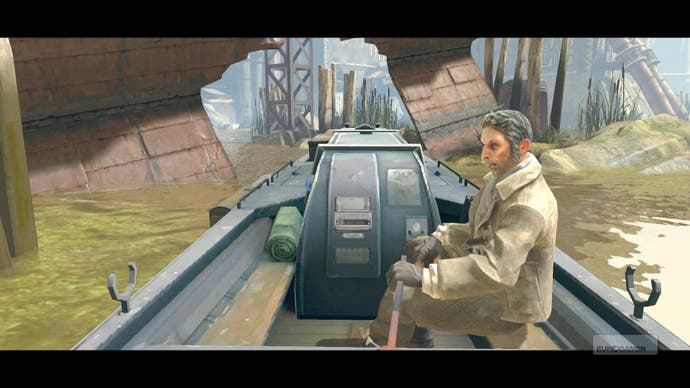
When you're trying to finish the game undetected, the Mission Stats screen takes on an almost mythical quality. You can review your objectives in your journal mid-mission, but there is no way to see whether you're successfully pursuing your real goal of clean hands and total discretion, so while you only see the Mission Stats screen once every couple of hours, you're always thinking about it.
For example, when you're halfway through The Royal Physician, perched on top of a giant steampunk drawbridge, teleporting slightly too close to arc pylons, you suddenly freeze and think, "Hang on, I wonder if they count as alert states when they spin up a little as I zip past at a supernatural pace." At least you probably think that if you have an unusually articulate internal monologue - I just think, "Oh bollocks. Err..."
You're always wondering what the numbers are going to be when you see that fateful screen, and the worry is exacerbated by the sheer number of times in Dishonored when you're utterly exposed and it would only take one guard's wandering gaze to trigger an alarm, or at least an alert state. Elsewhere in The Royal Physician, for example, I wanted to poke around Anton Sokolov's house before heading upstairs to meet him, and I especially wanted to steal the lovely painting sitting on an easel in the middle of a room full of City Watch guards, so I used Bend Time to pause their movements, blinked into their midst to snatch it, and then... Oops, time's returned to normal. I'm exposed! I need to get up on that pipe! Blink, damn you! Blink! Aaaaaaaaaaa!
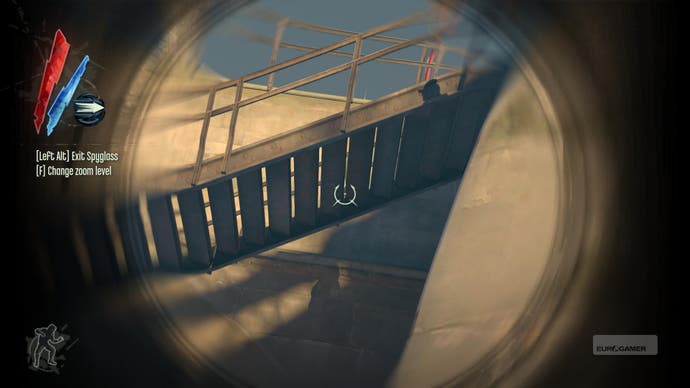
But that frantic feeling is nothing next to the tension you feel as you walk those last few paces back to Sam and he asks if you're ready to leave. Just show me the damn screen, Sam. Show me if anyone I left on top of a roof was randomly eaten by rats. Show me if someone found that dumpster I filled full of City Watch. Show me if I was ever detected. Because I don't know. I don't know the game intimately enough yet to tell whether the corner of that guard's eye or the extremity of that watch-tower's search beam saw just enough of my vanishing tail to record some misdemeanour on my stats screen. There's so much noise and so many voices in Dunwall, I can't easily parse everything as I play. The Mission Stats screen tells me whether I just wasted hours of my life or not. And to me, it's Sam's screen.
Anyway, I've blurred out the Special Actions on these Mission Stats screenshots so casual readers don't accidentally spoil something they haven't seen yet, but the rest is pretty self-explanatory. If you're playing the game the same way I am, you can imagine how I felt when Sam gave me the news.
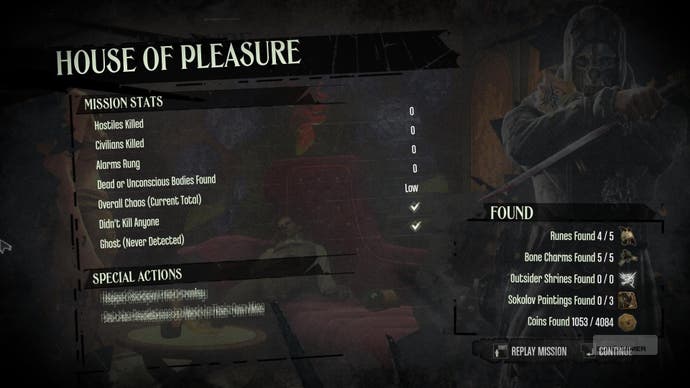
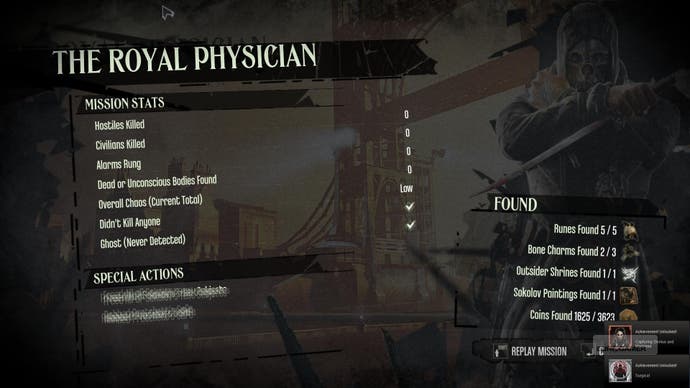
Thanks Sam. Until next time.
UPDATE #12: Chris mingles with the supporting cast
I've reached the big party sequence in Dishonored now (the level known as Lady Boyle's Last Party), so while I blend in with nobility, I thought it was probably time to rub shoulders with some of the game's more intriguing secondary players, too. I'm not yet halfway through the story, by the sounds of things - I'm taking this adventure very slowly - so I doubt that anyone has yet emerged in full.
Even in the fleeting glimpses I've got of him, though, The Outsider cuts a fascinating figure. He's a spectral presence in Dishonored: a creature of magic and mystery who is significantly older than Dunwall itself. He's the heretical force that the Overseers stand against, and it would be so easy for him to have become a bit of a cliché.
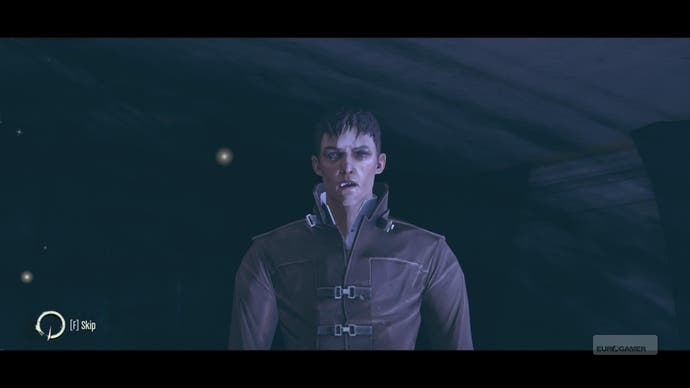
When I first heard the name Outsider, I expected a misty ancient, shrouded in darkness and fortune-cookie philosophy. When you finally meet him, however - on your first sleepover at the Hound Pits - he's a pleasant surprise: a young man, dressed in contemporary clothes. Something of a mocking rake, with a slight military air.
As I play through Dishonored, the game is really reminding me of Jonathan Strange and Mr Norrell, Susanna Clarke's witty and sinister blend of Jane Austen melodrama and counter-factual English history. Both are partially concerned with the intersection of magic and the aristocracy, but I don't think that's why the game seems like such a good fit for the book.
The dates don't really overlap, but The Outsider does: he strongly reminds me of Clarke's Raven King, another storied ancient who brought the forces of the supernatural with him. If Clarke's novel was a game, the Raven King would be the guy who gives you your special powers, just like The Outsider does. In return, The Outsider - as his name suggests - seems to exist beyond the confines of the narrative, much like the Raven King himself. He's the preoccupation of many of the game's central characters, and yet he appears bored by it all, and eager only to bring some amusement to his life.
The Outsider's finest moment so far is when he's explaining why he's never appeared before the royal physician, Sokolov, despite the man's career-long obsession with summoning him. "If he really wants to meet me," he says, "all he has to do is be a little more interesting." Pleasingly arrogant stuff from an omniscient force of nature.
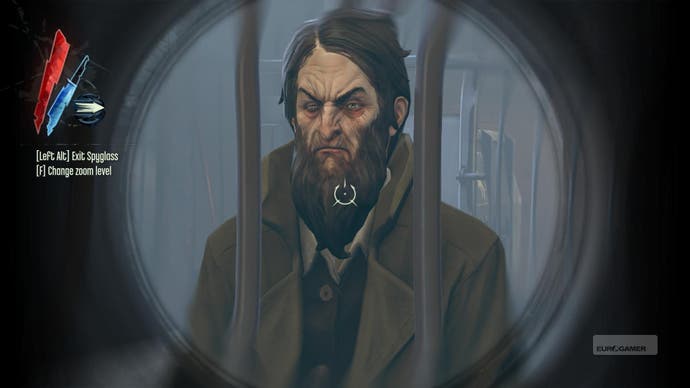
Sokolov's another lovely bit of characterisation, actually, and despite what The Outsider says, I think he is quite interesting. As the royal physician and the leading natural philosopher of his day, he's a ground-breaking scientist and one of the most important men in all of Dunwall. Discovered in his greenhouse near the bridge, the figure he cuts is pure Marxist revolutionary: huge beard, skinny frame, crimped, patronising features.
Sokolov's working on a cure for the plague, apparently, which seems to be little more than an excuse to infect Dunwall's citizens with nasty strains of virus. He's an emblem of warped curiosity - a painter as well as a scientist, and a drunkard as well as a painter. Having a man like this waiting for you at the end of a stealth mission is a bit of a treat.
If Sokolov seems to have sprung from a particular part of 19th century Europe, his rival, Piero Joplin, name aside, comes across as a classic American figure. Lanky and rather slack-jawed, he could have stepped from any number of dustbowl farmsteader photographs, and his dour, rather limp presence is accentuated by a voice that could almost belong to Deputy Dawg.
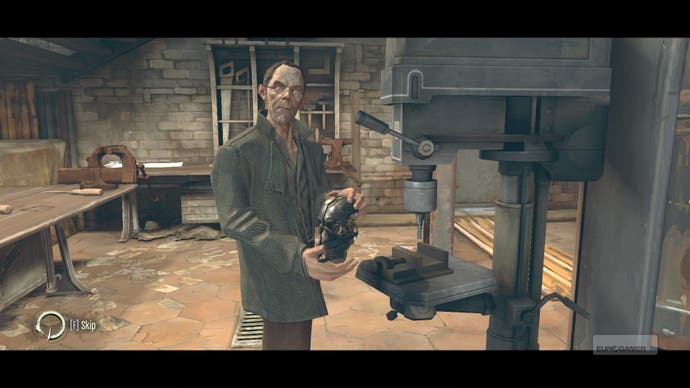
Joplin's another genius, of course - he makes upgrades for your weaponry, and built the fancy mask you wear into battle - and, in his own way, he's every bit as degradedly human as Sokolov. If Sokolov's a boozer, Joplin's a bit of a perv, either lamely flirting with a certain denizen of the Hound Pits, or spying on her through her bathroom key hole.
Arrogance, drunkenness, lechery: you don't have to look hard for heroic flaws in Dunwall. And with that, I'm back to the party, where my own tragic sin, awkwardness, with probably be in full effect.
UPDATE #13: Martin says life resembles art and stealth is easier than expected
There comes a moment when you know a game's seeped into your subconscious; it's when it manages to creep all over your waking, non-digital life. Dishonored's done just that, if last night was anything to go by. I'd taken a break between sessions in Dunwall, cycling to and from a friend's house in East London, when my mind started to drift, picking out little hiding places in dark doorways and wondering whether my freshly upgraded Blink ability would be powerful enough to whisk me away to that second floor windowsill.
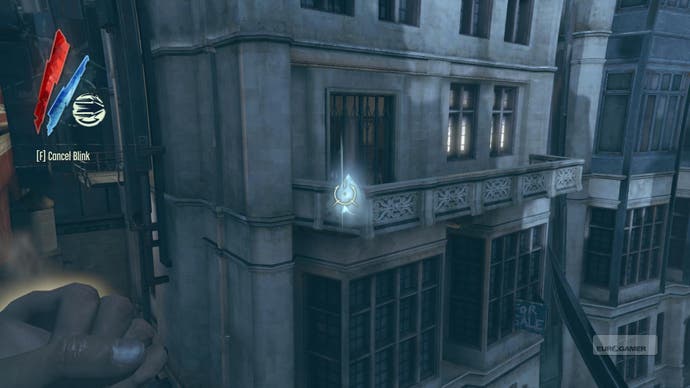
It certainly helps that there's a little of the Docklands in Dishonored's make-up. Edinburgh's most definitely the bigger influence, with parts of Dunwall looking like the Royal Mile after it's been hit by a bomb, but there's a little of Limehouse, Poplar and Shadwell in there too, partly in the squalor and partly in the dirty shores that they share alike.
Sometimes it's enough to make you do a double take, as it was when I pedaled past the Lord Nelson pub that's at the southern tip of the Isle of Dogs. And it's as I was idly staring, imagining Havelock and Martin hatching plans over a couple of pints of lukewarm ale, that I realised I'm just as clumsy in real-life as I am in the game, my front wheel riding the pavement and buckling as I sloppily tumbled to the ground. What a way to spend a Saturday night.
Well, I at least did get to go to a party, though I was a typically shambolic guest. I'd already played through Lady Boyle's Last Party earlier this year (and if you haven't just yet, you might want to turn away at this point for fear of spoilers), so I approached it in a more playful mood. Within minutes of stepping in I'd picked every guests pockets (oddly, despite a few huffs of disappointment, I was never stopped, and no one seemed to mind too much) and stealing every valuable that was available.
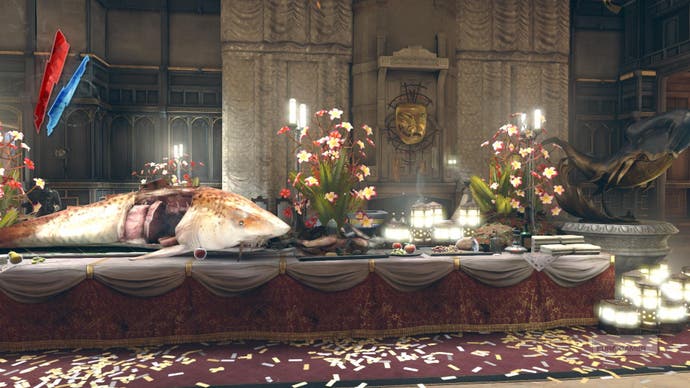
I also managed to dispose of Lady Boyle in a much more dignified manner than my last playthrough, although admittedly there wasn't much dignity in it for her, her throat slit and her corpse thrown to the rats of the house's cellar. It was, aside from the two objective-based killings, another stealthy mission with not one alarm triggered, and without being spotted once by enemy guards.
All of which has taken me by surprise, really - I'm typically a noisy oaf in stealth games, but there's something extremely forgiving, albeit exceptionally satisfying, about Dishonored's mechanics - you're so overpowered, the path of silence feels very much like the path of least resistance. So I'm approaching Dishonored's second half, and my forthcoming breach of Dunwall Tower, with a small amount of bravado. We'll soon see how that pays off.
UPDATE #14: Tom is bothered by fates worse than death
On the whole, the non-lethal path through Dishonored is morally justifiable.
I mean, of course it's not really morally justifiable. How many City Watch guards have I choked out and hidden in plague-ridden houses? How many survivors' homes have I looted for money and food? What do I imagine the consequences are going to be of those actions? But according to the rules that matter - those of the game world and any real-life instincts that can be conveniently grafted onto my meanderings through Dunwall without perverting my sense of entertainment - I am basically a saint, because I always find alternatives to death and violence.
But the non-lethal outcome to Lady Boyle's Last Party is a tough one to swallow. (I won't identify Corvo's target in the paragraphs ahead, by the way, but do stop reading if you don't want to know about the non-lethal outcome.)
So, as you'll know if you're reached this far into the game, Lady Boyle is the Lord Regent's mistress and source of income. The trouble is that there are three Lady Boyles and, when Corvo heads to their party, he doesn't know which one is the target. To find out, he has to mingle with the party guests, listen to conversations, and maybe sneak upstairs and poke around for clues. It's a lovely setup for a mission, and if you've spent the whole game up to this point lurking out of sight and piling up the bodies of unwitting guards so you can explore Corvo's surroundings at your leisure, then the switch to a masked ball setting where you can wander around in plain view is suitably novel.
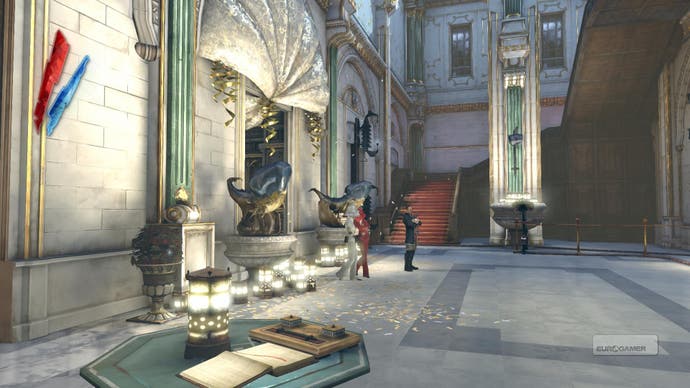
At some point during the party - around the time I was done stuffing antiques into my inventory while nobody was looking, as it goes - a man in a sackcloth scarecrow mask walks up and identifies himself as Lord Brisby. He's an acquaintance of Lord Pendleton (not itself a badge of honour judging by events earlier that day) and knows who you are and what you're here to do. He offers an alternative to killing Lady Boyle.
A lot of the other non-lethal outcomes in Dishonored are a bit nasty. The High Overseer gets excommunicated, making it illegal for the general populace to offer him assistance, and Lord Pendleton's brothers are set to work in their own mines with their tongues cut out and heads shaved so no-one can identify them. They are bad guys, even by the lofty standards of vice and corruption in Dunwall, and their punishments are also harsh. I felt a bit conflicted about the Pendletons, certainly, although a lifetime in the dark still seems preferable to having me stick a 12-inch blade through each of their throats. And besides, I only found out what Slackjaw (for it was he) planned to do with the twins after I'd done what he asked me to do to secure the non-lethal outcome.
That isn't the case with Lady Boyle. Brisby makes it clear what he wants to do upfront. And the difficulty is that it's a fate worse than death. He says that he's in love with her and suggests you knock her out and put her in his boat downstairs in the cellar. What's he going to do then? He just says that she'll be left alive (and the objectives page of your journal concurs) and that she'll come to appreciate him in time. Because she'll have the rest of her life to do so. So yes, the non-lethal outcome is to give her to a guy who wants to lock her in a basement forever and presumably spend some time in the basement himself. And you're fully aware of that before you do anything about it.
I'm committed to finishing the game and getting the low-chaos Clean Hands achievement (and hopefully the ones for not alerting anyone either), but I guess my hands aren't going to feel very clean now. It's an interesting problem for a game like Dishonored: the world around you and the things you do are increasingly grey and murky, but the criterion for success is still generally black or white, and if you are going for that morally justifiable playthrough then sometimes it's hard not to feel like you're being pulled in weirdly conflicting directions.
Or maybe the thing is to stop kidding yourself that there's anything moral about any of it. It just seems a shame to abandon the suspension of disbelief when it's so much fun otherwise.
UPDATE #15: Tom stops touching people entirely
I'm nearly at the end of my Clean Hands playthrough, and if I wasn't sure that stealth already trumped psychopathology for fun times in Dunwall, then a trip through the Flooded District has quietly removed any lingering doubt.
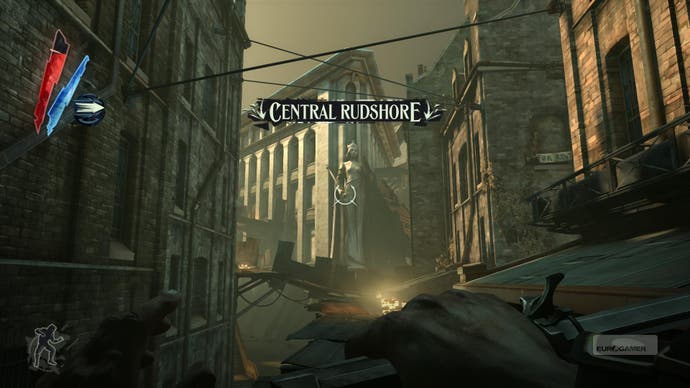
This section of the game (and I'm going to talk about it in detail, so please avoid if you're scared of spoilers) felt like such a drag the first time I played Dishonored. Back then I was slitting so many throats and doing so many wrong-headed things that even the supporting cast found it confusing. At one point I did a favour for Slackjaw that was supposed to mean he would save me the burden of having to kill my targets. I killed them anyway and returned to Slackjaw for... what? He had no idea either.
That sort of thing is fun for a while - as is using Corvo's supernatural toolset and traps to create grisly choreographed displays of violence that make you feel like a god among insects - but when I act like a monster in games I also feel like one, and that makes it harder to invest myself in the world. By the time I first reached the Flooded District, I didn't really care what was going on in it; I just wanted to stop every pulse I could locate, steal every rune and bone charm and keep pushing forward. It doesn't help that, as Oli pointed out yesterday, you're quite overpowered in Dishonored anyway, which feels much less exciting when you don't really care about remaining undetected or not.
In contrast, creeping around the Flooded District as a ghost is thrilling. So much so that I've upped the ante. There are no more piles of well-hidden snoring bodies for me - I won't even incapacitate someone now unless it's absolutely necessary. Whether it's a wandering weeper or one of the whaler-masked, leather-clad cult of assassins who stalk the rooftops of Central Rudshore, I want the extra challenge of slipping through their ranks without them even knowing. Snaking through carefully observed movement patterns using sneaky timed runs and blinks, and then getting the non-lethal outcome by pickpocketing their leader - after sitting just out of earshot and listening to his confessions, obviously - is delicious.
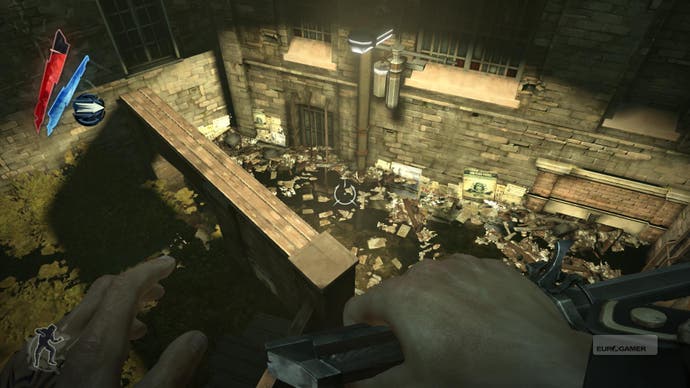
This is an interesting place. When the rat plague hit Dunwall, it took up all the city's resources, and the Lord Regent pretty much forgot about it, leaving Rudshore to drown under river waters that burst through ageing flood defences soon after. Half-submerged, it wasn't long before the looters and opportunists moved in and turned it into a nasty place, and the assassins claimed it completely not long after that. Its story is told through so many scraps of paper, abandoned whale-oil machinery and dead bodies. Exploring places like Rudshore and piecing together what happened to them is what games like Dishonored, BioShock and Deus Ex are really good for.
I'm pressing on. I know what's to come. It'll be interesting to see whether I can get through not only keeping my hands clean but keeping them in my pockets, too.
UPDATE #16: Chris turns to Hitchcock
Hitchcock used to call it the icebox moment. You go to see a film and you walk home with friends, chatting about it, explaining it, untangling the story from the plotting and setting it all straight in your head. You go to bed satisfied. Case closed.
Then, at three in the morning, you get up and go to get a snack from the icebox. You open the door and suddenly, something clicks. Something in the film didn't make sense. A loose end that doesn't tidy itself away neatly.
The rest of the night is torture.
I've encountered the icebox moment in Dishonored - at least I think I have - and I haven't even finished the game yet. Consider this a spoiler warning.
The icebox moment is this: how do you get to the third floor of the Hound Pits? The first (ground) floor's the bar. The second floor's the general living quarters. The fourth floor's the attic, where Corvo sleeps and his lantern sends out spooky twills of smoke.
The third floor, though? The third floor's blocked off.

That's as far as I can tell, anyway. The doorway on the stairwell's bricked up, and when you take a quick Blink tour of the exterior, all of the easily accessible windows are bricked up too. A few of the others aren't, but I can't see a way of getting to them. Yet.
I've tried everything I can think of. I've inched across the carpets of Corvo's bedroom, and I've wandered the second floor, eyes fixed on the ceiling. No gaps. No obvious hatches or means of entrance. Meanwhile, I've been busy with that bricked up doorway, too, lofting precious grenades at it, and visited Piero to load up on explosive whale oil drums. Nothing. I can't put a dent in it.
My last act was one of desperation: splurging runes on an upgrade to Dark Vision, which I already never use, in case it shows me useful machinery behind that bricked up door. Again: nada.
I'm done for now. The plot has carried me away from my friends and away from the comforting eternal sunrise of the Hound Pits pub. Will I be back? Not sure.
If I do return, I'm going to investigate one last theory. In Piero's lab, there's another bricked up entrance with a swirl of scorchmarks twisted across it. It's the mad scientist's teleportation experiment, apparently, and he calls it his door to nowhere. Two bricked up doorways, one with an intriguing gimmick to it. That's where I'm headed next, and I'm going to throw everything I have - literally, probably - at the problem.
There might be nothing behind the door, of course. It could be a meaningless enigma, or it could be waiting for DLC. It could even be some weird development dead end.
It strikes at the heart of what I'm really starting to love about Dishonored, though. This is a lean game, muscular and compact as a wriggling kipper, and it doesn't have a lot of ancillary systems that are just for screwing around with. It doesn't have a great deal of time for empty mystery, either - but the mysteries it has are all brilliant.
I'm deep into it now, wading through the Flooded District, aware of the odds against me. I hope I make it back to the pub, though. I want to live. I want to be victorious. I want to know what lies behind that sodding wall.
UPDATE #17: Oli had a lovely time at Lady Boyle's party
Sorry I've been out of touch for a while, everyone. I've been busy.
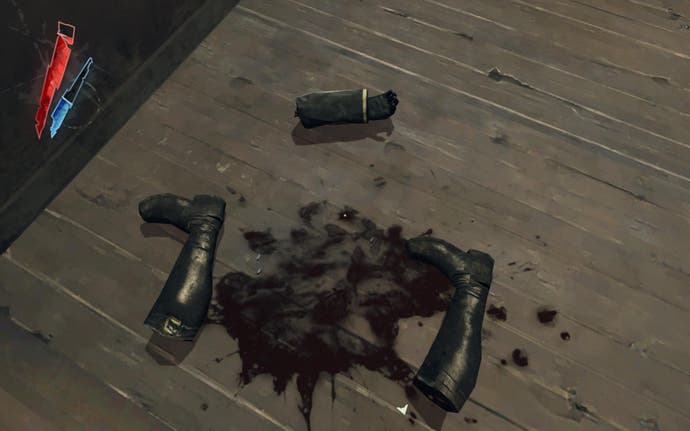
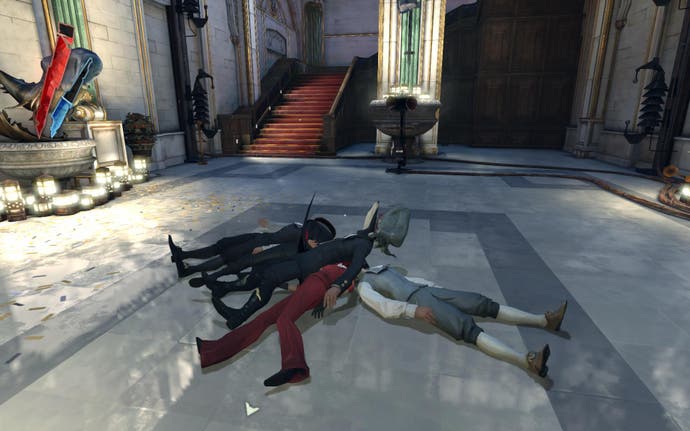
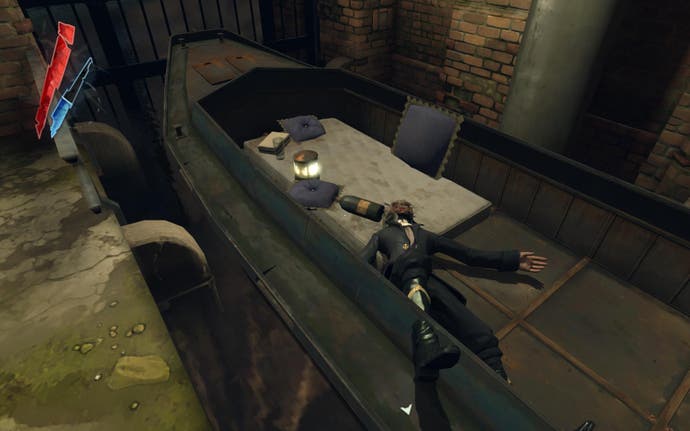
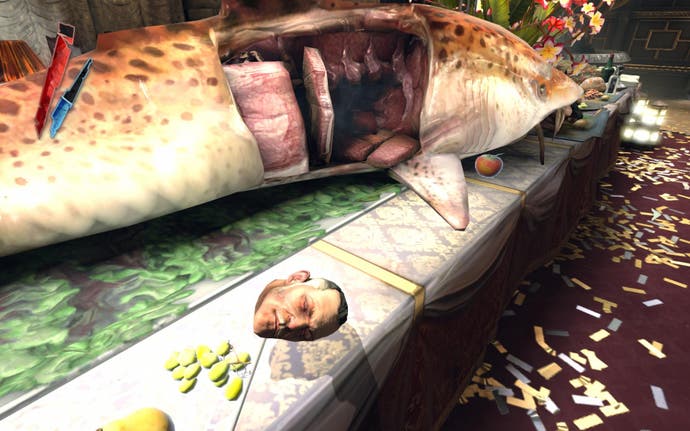
I signed the book on my way out.
OLI'S FINAL UPDATE: Confessions of a reluctant serial killer
You probably noticed that my updates dried up about halfway through our little experiment there. The sad reason for this is that Dishonored, when played deliberately for maximum carnage, simply isn't very interesting.
I'm in awe of the game's art direction and sound design. I respect Arkane's focus in bringing the acquired taste of first-person stealth up to date without diluting it. By all accounts it hits a gameplay sweet spot on a low chaos playthrough and can be an amazingly intense experience when going for ghost. Swing to the other end of the scale, though, and it turns into a rather distasteful mush in your hands.
We've mentioned before that you can often feel overpowered in Dishonored, but I'm not convinced that's the issue. That feeling applies to most gameplay styles, and it's not like any approach is without challenge either; just try killing every last soul in the Boyle mansion or taking down a pair of Tall Boys if you don't believe that a deep dedication to high chaos can be as exacting (and as sadly reliant on quicksaving) as ghosting a level.
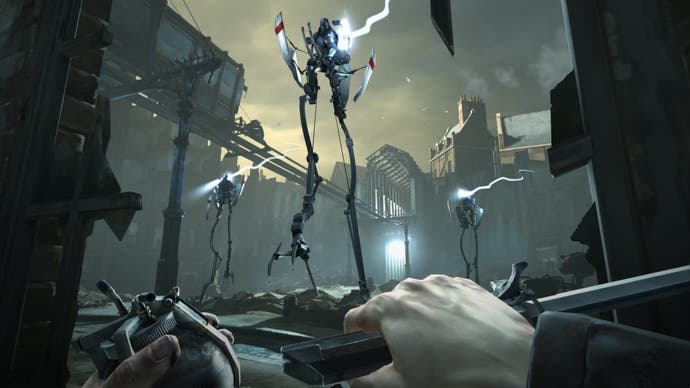
You feel overpowered partly because you get enough runes to complete a spec for a particular play-style quite early in the game. I think it's also a deliberate creative choice on Arkane's part: this is a superhero game as well as a stealth game, after all, and as Corvo you should feel like a dread avenging angel dispensing justice to mere mortals.
But I wonder if Arkane's attempt to create a wide range of possible actions within its narrow spaces wasn't a little misguided as well as kind of heroic. The various elements of the game aren't all pulling in the same direction.
Notably, there's a lot of friction between the skills and the level design. The majority of the powers seem like exciting tools for carnage, but the latter, with its impressive verticality and plethora of secret routes, betrays the fact that Arkane's heart belongs to stealth. By far the game's best idea and most satisfying interaction is the traversal skill, Blink; by contrast, combat powers like Windblast or Devouring Swarm are entertaining but sloppy to use. Anything more than a single, surgical stealth kill unavoidably ends up feeling messy as you're charged headlong by crowds of guards as stupid as they are relentless.
Dishonored is a stealth game through and through, and although it's to Arkane's credit that it managed to make it playable as an action game, it's only an above-average one. After the story reaches its midway tipping point, the high-chaos player doesn't even have the ghoulish satisfaction (if that's the word) of running riot through mansions and brothels. The game takes on a grey, militaristic tone familiar from decades of first-person wargaming: a thrilling challenge for a ghost, just another day's slog for a super-soldier.
Like so many games that offer the player a choice, Dishonored can't keep itself from judging you for what you choose. You're permitted to play it as a game of indiscriminate killing, ostensibly you're even encouraged to, but you'll sense all the time that you're doing it wrong in the eyes of the designers, and you'll have less fun as a result.
It's also an intensely moralistic game - up to a point. Taking a violent path leads Dunwall into a maelstrom of disease and corruption, and the high chaos ending quite explicitly damns you for what you've done. It's certainly a statement, in this day and age, for a major video game to give you the opportunity to complete it without killing anyone. But that didn't stop Arkane's animators from lingering in lasciviously gory first-person over steel slicing through throats, rats eating corpses and decapitated heads hitting the floor, all the better for these images to play out on the back of your eyelids as you're trying to go to sleep. Eugh.
Maybe I'm just grumbling and feeling queasy because I was tasked with playing Dishonored in a way that doesn't come naturally me. But I do feel that, for all its remarkable quality, this is a game that tries to have its cake and eat it. I'd have liked it better if it had had the courage to stick with its true identity: the moral one, the methodical one.
After this weekend, I know that I haven't got it in me to play the psycho. Arkane should realise that too.
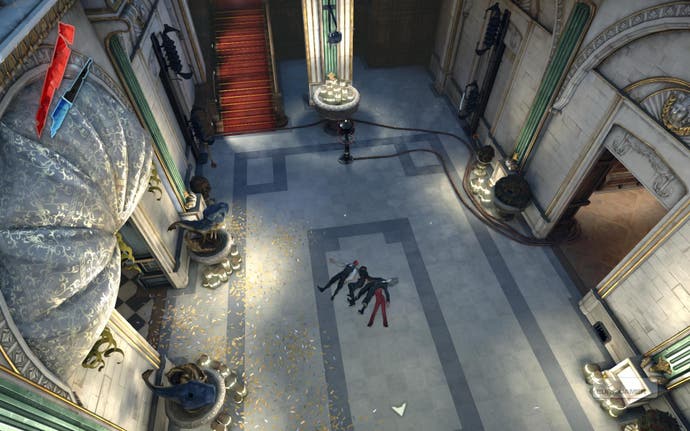
MARTIN'S FINAL UPDATE: Low chaos, highly disordered
And so Corvo the clutz's reign of error is over, and Dunwall can rest easy once more. I've finished up Dishonored's story, teetering somewhere between stealth and violence and - with some 50 people having seen the sharp edge of my blade, the point of my crossbow bolt or who just slipped into a pool of hungry hagfish - landing at the low chaos ending.
I was surprised to be rewarded for restraint that was perhaps a little lacking towards the end. After some early fumblings I'd managed to slip comfortably into Dishonored's cosy patchwork of systems, and stealth was coming so, so easy. But then something clicked, and the bravado that I went into the final part of the game with turned into impatience and a little purple rage. A quick warning - that little something clicked well into the more spoilerific parts of Dishonored's story, so if you've yet to see it through to the end, best turn away now.
I'd like to say that the shift in philosophy was informed by the plot's telegraphed twist, my violence born from a deeper, darker sense of injustice than that had been fuelling me before. It actually happened, though, when I was sliding around on my knees - I do love a good floor-slide, and Dishonored's is up there with Mirror's Edge when it comes to the art of lunging around feet-first - and I kicked a loose brick into a guard's face.
The staccato stutter of repeated quick-saves had, by that point, become tiresome, and I decided to just let things play out, allowing a swarm of guards to swamp my position, their swords held angrily in the sky. And so I stopped time - I'd only recently maxed out that part of Corvo's supernatural arsenal - and cut my way through the frozen moment. As the seconds started ticking again and the bodies all slumped to the floor, I realised there's something to be said for the simple slapstick joy of violence.
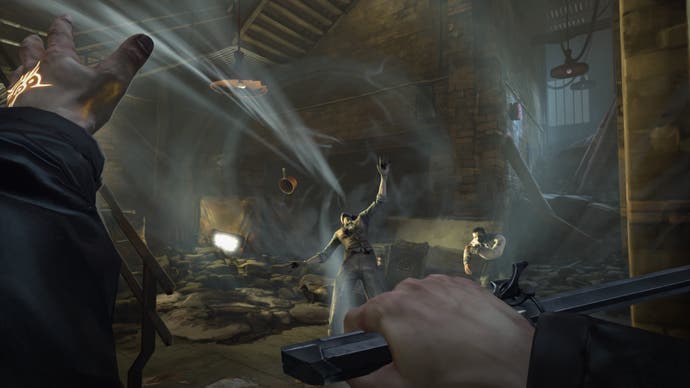
It also felt like some form of petty revenge on the game itself for one of its few missteps, the introduction of the River Krusts. They're spiteful things, spitting corrosive liquid indiscriminately at players, and they feel cruel and more than a little pointless. Slashing away at them wasn't quite enough, I thought - I wanted the game to know how angry I was.
There was little guilt, then, when I cleaned out the Hound Pits, and there certainly wasn't any when I messily made my way up to the top of the lighthouse, at one point tearing a head clean off and pinning it to a fluttering flag with a well-placed crossbow shot.
After all that bloodshed, the award of a low chaos ending was something of a disappointment, and revealed how binary Dishonored can be - it's all or nothing, kill everyone or don't be spotted at all, and while it's perfectly plausible to meander in the middle it's quite likely the least satisfying approach to take. It's not quite the analogue experience I'd imagined, though I'll certainly be quick to return and discover those extremes for myself.
CHRIS'S FINAL UPDATE: Pondering the boldest measures, and the safest
As Martin mentioned in a recent update, Dishonored's one of those magical games that bleeds through into your real world if you'll let it. I live in Brighton, a 19th century muddle of narrow streets and dirty brickwork, and a town that, to quote Keith Waterhouse, looks like it's helping the police with its enquiries. Dunwall's got the 19th century brick thing in spades, too, so it probably shouldn't be that surprising when I get the odd flashback while wandering around.
What would Waterhouse say about Dunwall? He might say it's a city that looks like it's helping the Watch with a cover-up. By the end of my playthrough - and this, as a lot of what follows, is a spoiler - almost any remaining shreds of hope for the future had blown away on a drizzly wind. I'd turned the place into an accidental abattoir - not that it needed too much of a push.
The idea for my run at the game, if you can remember all the way back to Friday, was that I'd approach Dishonored as an archaeologist (although if Tony Robinson ever pulled off some of the stuff I've done, Time Team would be post-watershed viewing). I'd try to find out what made this clockwork world tick, in other words, and I started off with the best of intentions, too. For hours, I stopped to chat with anyone I met who wasn't trying to stab me, and I read absolutely every scrap of paper I could find lying around. I was a book thief, in essence, a prowler with a literary agenda, nicking coins and pilfering potions, sure, but also raiding the stacks and turning the pages.
On balance, this probably wasn't the best way to tackle things. Dishonored's text logs give you a lot of additional information about the social issues of the day and the climate of the wider world that Dunwall fits into, but if you seek some proper understanding of the city, it's actually far better to, y'know, look around you. Scribbled notes can tell you that the Overseers are bad-'uns, for example, and that they essentially kidnap promising children to fill their ranks before disposing of the ones that don't make the cut, but you get a lot more of an insight into the weird blend of religious fervour and political pragmatism that marks them out by sneaking through the rather churchlike buildings they inhabit, or knocking about in the cells where they keep their hounds.
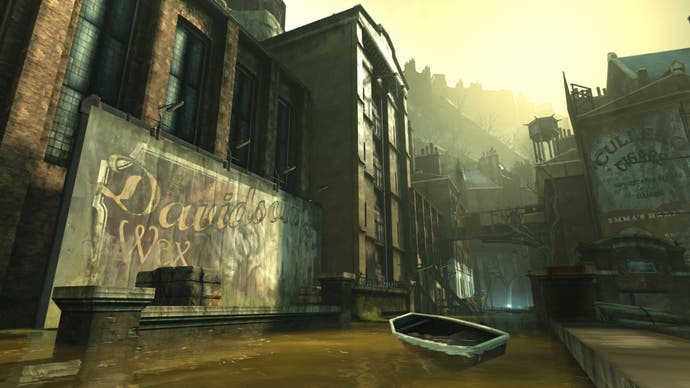
When you look at the environment, in fact, you get a real sense of Dunwall and its troubled present. Its shattered streets tell you of the constant struggle involved in keeping the peace, while its barricaded plague houses cue you into the government's troubling approach to containment. In the battle for the city, the disease is winning: the lower classes have been all but wiped out, the avenues hum with the passing hulks of corpse carriers, and the rich have retreated to fierce little hubs of debauchery, locking themselves away as the ceaseless party grinds on, often with a hint of hysteria.
As well as the contemporary stuff, Dunwall's alleyways and towers also offer glimpses of the city's own history, both outside of the narrative, with its many nods to designer Viktor Antonov's earlier work on Half-Life 2, and within the fiction, with the way its more recent buildings build upon its older ones. Whether it's the giant metal gates and watchtowers sprouting from crumbling factories and taverns, the air con units and venting bolted on to creaking town houses, or even the fact that, when you journey down into the sewers, you'll find street signs nailed to the wall, this is a metropolis where expansion has been haphazard and uncaring, where the old has been covered over by the new in a rushed and thoughtless manner.
Many of the things that are wrong with Dunwall come from plots and betrayals, in other words, but as the landscape suggests, just as many are the results of acting without thinking properly first; of favouring the easy option rather than the better one. There's a twist about two thirds through the game that serves as a testament to this fact, and the casual player, ending up with the high chaos ending, reinforces it too. Stealth in Dishonored takes time, patience, planning, and care, and your reward is the knowledge of a job well done. Fumble through each level, however, and the dead start to pile up. Some people kill because, like Oli, they're trying to be as bloodthirsty as possible. I've probably matched his bodycount, though, and it's mainly because I was simply in a hurry.
"The Boldest Measures are the Safest," says the sign that dominates Dishonored's start screen. The game itself - and the city it's set in - are proof that this isn't true. The bold player - or perhaps the impetuous player - is the player that fights their way through Dunwall. It's the player that leaves the streets loaded down with extra corpses, and adds a new, rather grim, stratum to this wonderfully horrible environment.
TOM'S FINAL UPDATE: Clean Hands, happy memories
Finished! Around 5pm on Sunday I reached the end. The final bodycount was zero, I never alerted anyone, and I got the low-chaos outcome. (I won't spoil the events of the last few levels in this update, by the way.)
I didn't get either the Clean Hands (no kills) or Ghost (don't kill/alert anyone) achievements, but I did get the Shadow achievement for zero alerts and none of my Mission Stats screens list any kills. So that's weird. Someone on Twitter suggested to me that my mistake was right at the start of the game: "I heard that for getting the achievement you mustn't kill the three assassins in the prologue," he said. Thank you @Knurrunkulus. I will put your words to the test sometime.
Do I feel clean? Yeah, I guess so. Apart from the Lady Boyle episode (see update 14 above), the hardcore stealth playthrough was very much to my taste. Rejecting Dark Vision was a good idea (I would have removed it from the game entirely if it was up to me), and it definitely became more challenging and exciting when I stopped incapacitating people, too, probably peaking with that trip through the Flooded District to deal with Daud.
If I ever come back, I'll probably go for a Very Hard playthrough aiming for the "Mostly Flesh and Steel" achievement, awarded for completing the game using only Blink and not even upgrading agility, just to push myself even further in this direction. It's what I like. It's why I spent so many hours crouching behind desks in Deus Ex: Human Revolution last year reading people's emails. It's why I'm hoping Eidos Montreal doesn't muck up Thief 4.
As much as I enjoyed Dishonored, though, it's hard not to feel that it lacks some internal consistency. It's great if you love sneaking between the sight lines of progressively more inquisitive and densely arranged foes, then picking through the scraps for trinkets and insights when their backs are turned, and the whole game seems set up for players who want to do that. But there's almost no reward for the stealthy player beyond stealth itself.
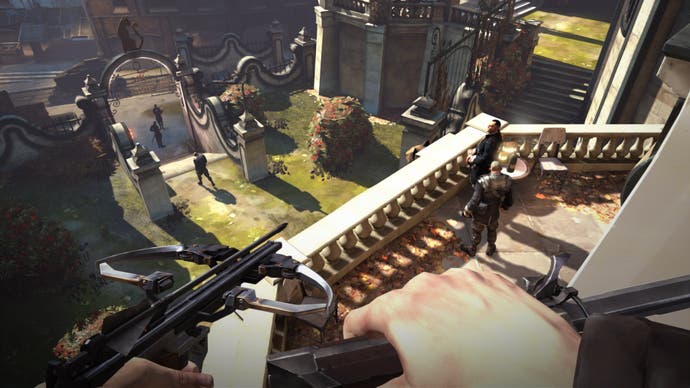
Money and runes are pretty pointless once you've fully upgraded your Blink ability and optics, which you can do within a couple of hours of the start, and maybe a tenth of the bone charms I found were actually relevant to my play style. Everything else would have been useful for a chaos-focused player, but there isn't a New Game+ option, so I would have to load up old save-games and just treat them as mini sandboxes if I wanted to go that route and play around with the other systems. And having seen both, I can say that the final mission low/high chaos variations are interesting, but maybe once the game figured out which direction you were heading it could have reconfigured itself a bit more before that.
I'll miss Dunwall though. Some elements of the game don't quite work out or knit together as neatly as they could, and there are times when you wish the bones of other games would stop poking through the skin (like the books from Elder Scrolls and so many visual cues from Half-Life 2), but it's full of character. I'll miss the Hound Pits pub, I'll miss Piero and Sokolov and Sam the boatman, I'll miss the Overseer in the kennels talking to his dogs in a cutesy voice... You can tell you're falling under a game's spell when the repetitive incidental dialogue crosses over into something you smile when you hear. "Think you'll get your own squad after what happened last night?" "Chances are good." I'll miss all of that. It's a cliché to say that so many games these days lack character, but there's a reason that it's a sentiment that's achieved that status. Dishonored is refreshing in that respect.
Most of all, though, I'll miss Blink. It's such a simple idea - teleport where you click - but it gives Dishonored a flavour of its own, and it will be strange not to taste it on my palate the next time a game like this invites me into the shadows. Then again, it's also nice to think that I probably won't encounter it again, because the sort of studio that turns out Dishonored probably doesn't react to its success by repeating itself. If there's any hope to be found in Dunwall, perhaps that's it.
